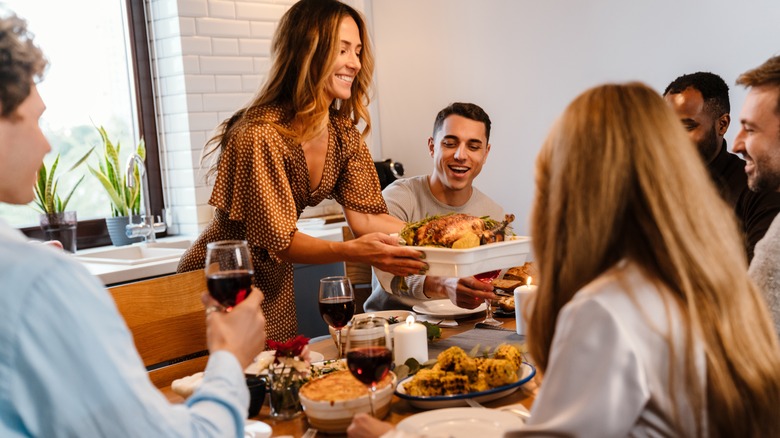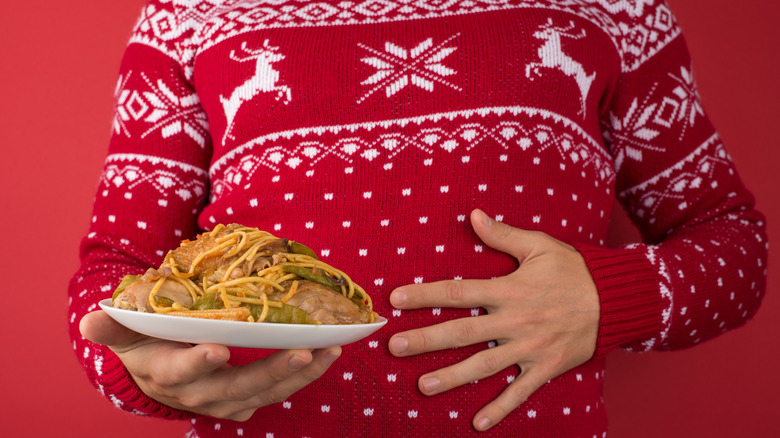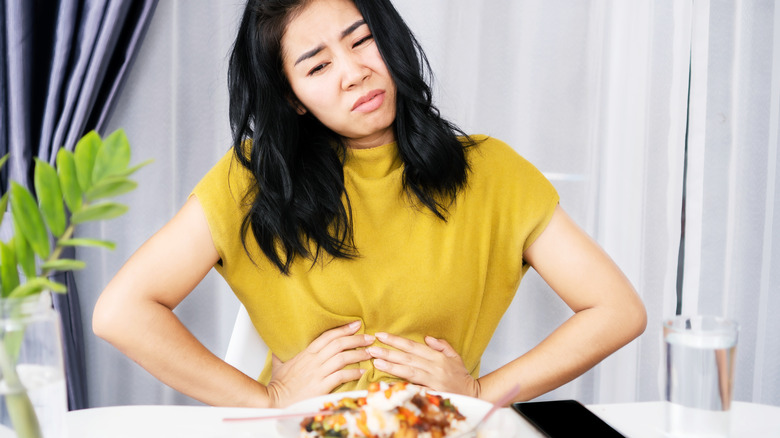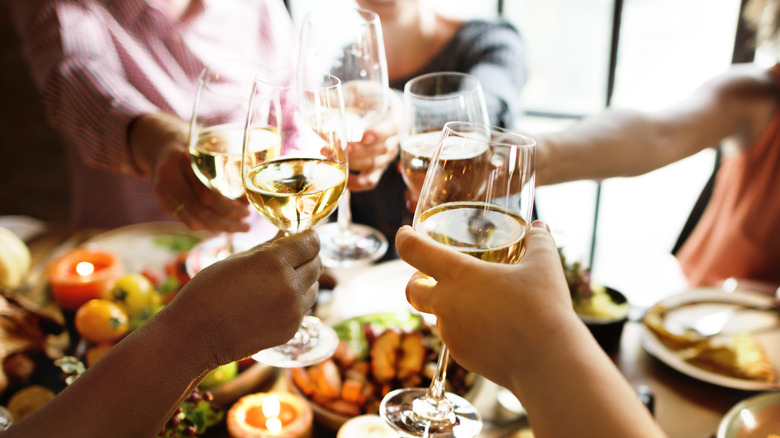An RD's Best Recommendations For Avoiding Common GI Issues During The Holidays
The holidays bring good times with great food, including Thanksgiving feasts, winter-themed cocktail parties, and mugs of hot cocoa with marshmallows by a warm fire. Let's not forget the pumpkin spice lattes and eggnog. However, the holidays also can lead to stressful times, like rushing for last-minute gifts and dealing with contentious relatives. Whether it's the stress on our bodies or all the rich food we consume, the holidays can cause gastrointestinal issues.
In an exclusive interview with Health Digest, Registered Dietitian Nutritionist with Vivante Health Deanna Dahlinger, an expert in digestive health and medical nutrition therapy for gastrointestinal diseases, shares why we experience such digestive issues during the holidays.
"While festive foods are a big part of holiday celebrations, these foods may be a bit different than one's typical diet, potentially triggering digestive issues along the way," Dahlinger says. "We're talking pies, cookies, cakes, and decadent foods like mashed potatoes with butter, gravies, and roasts. These foods can be more difficult for the body to digest. With the excitement of the holidays and the joy of all the delicious foods, it's common to overeat, which can be a secondary trigger for digestive symptoms."
How to deal with holiday bloat
Dahlinger says bloating is common during the holiday season. Bloating occurs when the excess food in our diet overloads our digestive system and the digestive gas makes our bellies swell (via ABC News). Dahlinger says, however, that since our eyes and noses can often signal the belly to prepare for some delicious food, you can practice mindful eating to improve your digestive processes.
"If you're feeling a bit stressed, consider taking a few deep breaths to help relax your body before you dive into the meal," she advises. This also means avoiding distractions while you eat and savoring each bite slowly. "Take a minute or two to notice what you're eating, how it smells, looks, and the different textures." It also helps to put down your fork between bites.
You also might want to avoid certain foods. According to Women's Health, foods high in fat take longer to digest and can leave you feeling extra bloated. Excess sodium in foods such as holiday ham can cause you to retain extra water.
How to handle acid reflux and constipation
Holiday eating also means indigestion, heartburn, or acid reflux. Dahlinger notes that spicy and fried food, chocolate, peppermint, carbonated drinks, coffee, caffeinated tea, and high-acid foods like tomatoes can often trigger more acid in the stomach.
"How we eat is just as important as what we eat," Dahlinger adds. "Acid production is at its peak three hours after eating a meal. Avoid laying down after meals, and consider spacing your bedtime or naps further away from your meals to minimize any reflux."
The holidays also can cause a backup in our digestive system. Dahlinger suggests soluble fiber such as berries, flax seeds, or broccoli to help get things moving again. "Consider starting the day with a bowl of oatmeal, chia seeds, nuts, and berries if you anticipate a bigger holiday meal later in the day," she says. "If you're traveling for the holidays, pack fresh fruit, nuts, or seeds to bring with you on the go." Dahlinger adds that water can help support our digestive system. Although it might be tempting to skip workouts, Dahlinger says staying active during the holidays can stave off sluggish bowels.
How we can enjoy our food without digestive stress
Dahlinger says we can still indulge during the holidays, but it's best to eat indulgent foods in moderation. She suggests filling up half your plate with vegetables and eating them first to help keep our appetites under control. "If you start by eating your vegetables, you may feel more satisfied with your meal, thanks to all of that fiber," Dahlinger says. "This could mean one less cookie or only one slice of pie instead of two or three."
Perhaps a good nap after a big feast might seem appealing, but Dahlinger says this might not be the best idea. Instead, opt for an easy walk. "Not only will this help alleviate that sluggish feeling after a large meal, but it can also support optimal digestion, easing common concerns such as reflux and bloating," Dahlinger says. A walk with family also lets you enjoy time together while giving your metabolism a boost.
To find out more ways to improve your digestive health, head to the Vivante Health website.




